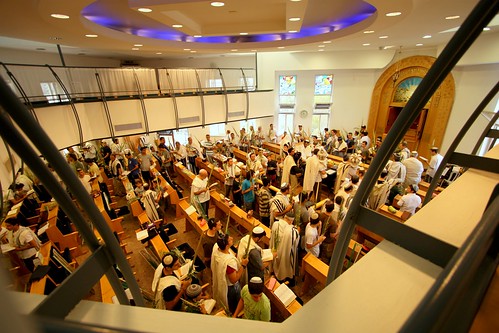
It’s not always immediately obvious to the casual observer what the real difference is between Orthodox and Modern Orthodox Judaism. Actually, even to me, the two communities, on the surface, seem pretty similar. So one of us likes to think we’re modern. We’re cutting edge. But when you walk into shul on Hoshana Rabba and see a group of men beating the ground with willow leaves it’s hard to see the modernity.
I had a meal with a more “yeshivish” family this past Shabbat which threw things into perspective a little. In this family, like many in that community, the men spend their days in kollel and yeshiva learning Torah and Jewish law. I’ve always been of the opinion that those who dedicate their days to learning are to be admired for their devotion to Judaism, and I maintain that approach. However, it has its drawbacks – and can lead to some opinions which are more reminiscent of the 1800s than 2012.
During the meal, one of the sons was discussing a girl he has been seeing. After describing both her positive and negative qualities, he then made a statement which I found astonishing: “Women don’t think,” he bemoaned. In this young man’s opinion – and, quite probably, in his experiences – women do not think. That’s what men are for. Women, he explained, are told what to do and do not think for themselves. The fact that he stated this in front of myself, a college student, and my mother, who has a law degree and two Master’s degrees to her name, was more than a little preposterous.
But in his world, women are not meant to think. Sure, they go to school, and they often earn post-graduate degrees so that they can support their husbands in kollel, but they are not taught to think for themselves. They go to schools where asking challenging questions is not only frowned-upon, but actively discouraged.
Sound ridiculous? This is what the world at large was like for most of its existence. But that world has changed, and we in the Modern Orthodox world have accepted and embraced those changes. Yes, on Shabbat, we’ll pass up television and texting in order to put Judaism first. But on Sunday we’ll go to museums and learn about art and science and history with the rest of the world.
Modern society is not always the harbinger of positive developments. There are things happening in the world that a nice protective bubble of religion would do well to keep out, things like rainbow parties, toddler beauty pageants, and really bad reality television. But without it, the bubble becomes just that – a floating bubble with nothing to ground it. A world where things are the way they are simply because they’ve always been that way.
That little qualifier, the Modern in front of our name, really does mean something. It may be a struggle to give credence to the two often-conflicting sides of our identity, but it’s a struggle worth having. There’s beauty in the desire to maintain the balance between the real world and our self-constructed sphere of Judaism. We may not always succeed 100% at teasing out the positive from each world, but the unceasing effort to do so is an accomplishment of its own.
